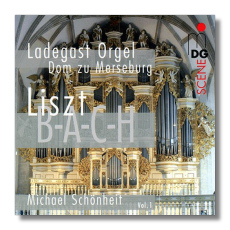
The Internet's Premier Classical Music Source
Related Links
- Liszt Reviews
- Latest Reviews
- More Reviews
-
By Composer
-
Collections
DVD & Blu-ray
Books
Concert Reviews
Articles/Interviews
Software
Audio
Search Amazon
Recommended Links
Site News
 SACD Review
SACD Review
Franz Liszt

Organ Works, Volume 1
- Franz Liszt:
- Prelude and Fugue on the Theme B-A-C-H
- Weinen, Klagen, Sorgen, Zagen – Prelude after J.S. Bach
- Variations on Weinen, Klagen, Sorgen, Zagen
- Drei Bach Bearbeitungen:
- Aus tiefer Not schrei ich zu dir
- Adagio
- Ich hatte viel Bekümmernis
- Johann Sebastian Bach: Passacaglia in C minor BWV 582
Michael Schönheit, organ
(Ladegast-Orgel, Dom zu Merseburg)
Dabringhaus & Grimm MDG9061334-6 Hybrid Multichannel SACD 73m DDD
Also released on CD MDG6061334-2
Amazon
- UK
- Germany
- Canada
- France
- Japan
]
Amazon - UK - Germany - Canada - France - Japan ]
This album is a profound homage by the greatest piano composer to greatest organ composer in the history of music. In an article Liszt published on February 16, 1851, he emphatically referred to Bach as the greatest musician Germany had produced and predicted that the Master's monumental compositions will remain the object of admiration and amazement for centuries to come.
It was in Weimar that Liszt became deeply acquainted with Bach's works, and during this period, he wrote three important compositions; the Prelude and Fugue on the name B-A-C-H, the Prelude after Weinen, Klagen, Sorgen, Zagen and the Variations on the basso ostinato from the first movement of Weinen, Klagen etc coupled with the Crucifixus from the B minor Mass.
All three pieces feature on this disc, taking up a large portion of playing time. The remaining four items are three short works based on BWV 21, 38 and 1017 respectively and Bach's Passacaglia in C minor, BWV 582 in an arrangement by Liszt's great friend Johann G. Topfer.
Michael Schönheit is one of today's foremost interpreters of such repertoire and these renditions are a testimony not only to his great empathy with these composers but also to his caring love for the organ itself. At times, I was given the impression that Schönheit was not playing but caressing the instrument. The Merseburg Cathedral Organ is not only steeped in history, but its sound is sonorously and majestically rich, perfectly suited for such eloquent works.
The annotations by Axel Schröter and Peter Ramm are absolutely riveting, particularly the latter one on the history of the organ. An excellent first lap of what should be an outstanding series.
Copyright © 2005, Gerald Fenech


















